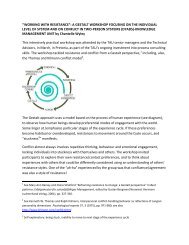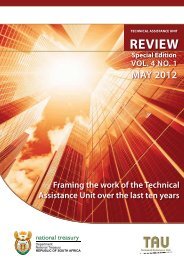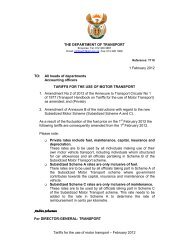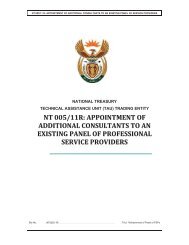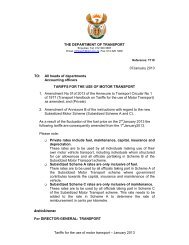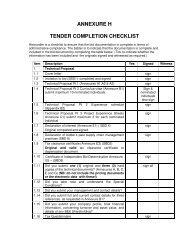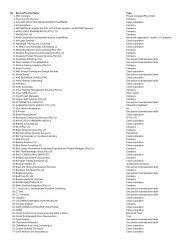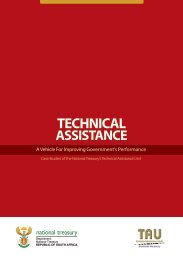Review 3 final 2 - TAU - National Treasury
Review 3 final 2 - TAU - National Treasury
Review 3 final 2 - TAU - National Treasury
Create successful ePaper yourself
Turn your PDF publications into a flip-book with our unique Google optimized e-Paper software.
TECHNICAL ASSISTANCE UNIT REVIEW | From “Kuvernan” to Cyber-Networks<br />
South African Context<br />
South Africa is currently deemed a liberal democracy.<br />
As political and economic liberalization processes took<br />
place after a closed, illegitimate and authoritarian political<br />
system came to an end in 1994, the opening up<br />
of the economy has meant a less protectionist state,<br />
that allows for greater individual rights to freely participate<br />
in the politics and economy of the country<br />
while protecting private property and life of its citizenry<br />
(Gildenhuys and Knipe 2000: 28). A liberal state<br />
by its very definition promotes freedom of association<br />
and, in that way, promotes the proliferation of networks;<br />
networks that redefine state authority and promote<br />
different methods of governance. South Africa<br />
is increasingly working along these lines (of networks)<br />
both within its constitutional framework and beyond<br />
as the following areas indicate.<br />
Co-operative governance and the network<br />
state<br />
The South African constitution also sets out the principles<br />
of co-operation between national, provincial<br />
and local spheres of government. The third chapter of<br />
the constitution states that Parliament must pass legislation<br />
facilitating ‘inter-governmental relations’ and<br />
delegates certain powers and functions to the various<br />
tiers of government. This is a significant issue as far as<br />
decentralized government is concerned and offers an<br />
opportunity for more deliberative and participatory<br />
method of public policy making.<br />
The shift from local government to local governance<br />
is also illustrative of the widespread dissatisfaction<br />
with the limited reach of set solutions to difficult and<br />
nuanced political issues imposed through top-down<br />
government intervention (Hajer and Wagenaar 2003:<br />
6); and proposes a more creative, bottom-up approach<br />
that views public policy making as an increasingly<br />
discursive process that has legitimacy as far as it can<br />
address the many facets of public life, through proper<br />
consultation with those that are affected the most by<br />
such policy. Our Local Government Elections provide<br />
a defined milestone in local governance and we are<br />
watching with interest the results of these and the impact<br />
on developmental local government.<br />
The idea of governing through networks, and networks<br />
exercising various means and power in discursive<br />
policy processes, raises the issue of social inclusion<br />
and social exclusion in policy making processes. Ability<br />
to access the technologies, organisations, individuals<br />
and processes that enable social inclusion are also key<br />
and, as such, an important consideration here is the<br />
ability of vulnerable groups, such as women, children<br />
and people with disabilities to influence policy making<br />
processes and be part and parcel of the governance of<br />
the nation state.<br />
The Constitution of South Africa:<br />
Custodians of Good Governance<br />
Within such ‘modern moments’ of considering governance<br />
within the hyper knowledge and digital age, it is<br />
reassuring to note that these issues are taken up very<br />
clearly in the Constitution of South Africa and in particular<br />
in Section 195 which enshrines the “Basic Values<br />
and Principles governing public administration”.<br />
Therefore South Africa has set out a legal and moral<br />
undertaking to govern within values and principles as<br />
outlined. Furthermore, beyond the moral imperatives<br />
as well as the statutory frameworks that legislate specific<br />
areas inherent in the values and principles, South<br />
Africa has set oversight mechanisms that measure and<br />
offer informed commentary on whether we match up<br />
to the ideals of good governance. Naturally, there is the<br />
supremacy of Parliament in terms of oversight. There is<br />
page 5<br />
Enabling change for development



